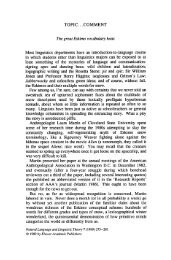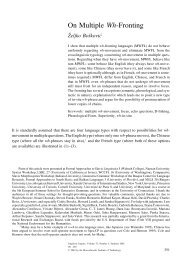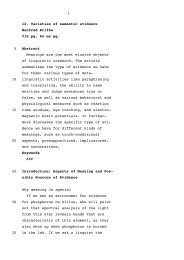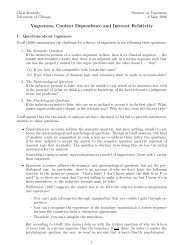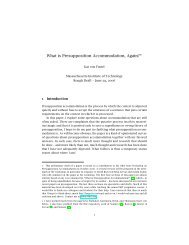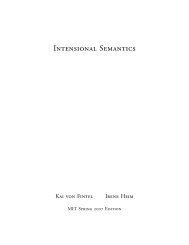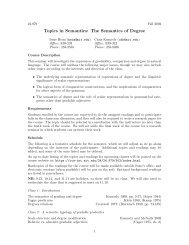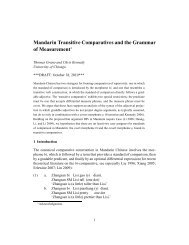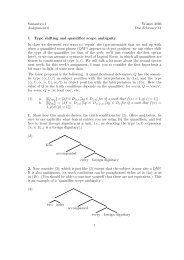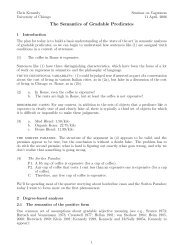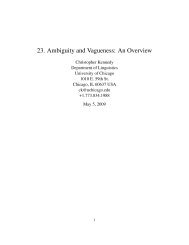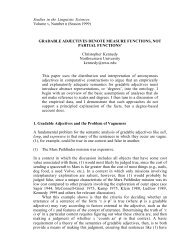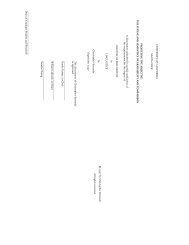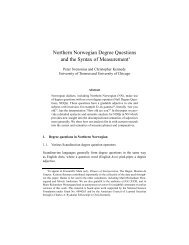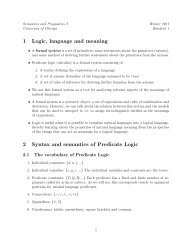On the natural history of negative polarity items - Syntax, Semantics ...
On the natural history of negative polarity items - Syntax, Semantics ...
On the natural history of negative polarity items - Syntax, Semantics ...
Create successful ePaper yourself
Turn your PDF publications into a flip-book with our unique Google optimized e-Paper software.
Alexander Williams<br />
<strong>the</strong>ory <strong>of</strong> pronouns. Suppose we say that a freely available pronoun, unlike a lexically specified<br />
NCA, does not have its implicit restriction set by <strong>the</strong> verb, and remains incomplete. Then <strong>the</strong> it<br />
in (1c) just means ‘<strong>the</strong> ’, with anaphoric. Evidently <strong>the</strong> anaphora fails, despite <strong>the</strong> entailment<br />
that anything won is a contest or a prize. We can follow Elbourne (2005) in requiring that <strong>the</strong><br />
nominal anaphor have an overt nominal antecedent. In <strong>the</strong> talk, I weigh <strong>the</strong> plausibility <strong>of</strong> <strong>the</strong>se<br />
two options.<br />
I close with a new puzzle for any <strong>the</strong>ory <strong>of</strong> NCAs, which may hit <strong>the</strong> description <strong>the</strong>ory hardest.<br />
(1a) is an instance <strong>of</strong> a broader fact, established in Hankamer and Sag 1976 and Grimshaw 1979.<br />
When an NCA governed by verb V has an overt antecedent, it need not match <strong>the</strong> form <strong>of</strong> an<br />
overt complement to <strong>the</strong> V, (5). But <strong>the</strong>re is an unfamiliar exception to this pattern, involving<br />
a class <strong>of</strong> NCA verbs represented by notice and forget. These can be anteceded by a declarative<br />
clause, (6), but not by a DP, (7). (The intended antecedents are bolded.) This cannot be explained<br />
by implicating ellipsis <strong>of</strong> a complement clause under identity with <strong>the</strong> antecedent (Hankamer and<br />
Sag 1976, Grimshaw 1979, Depiante 2000). So it seems to require unprecedented restrictions on <strong>the</strong><br />
semantics <strong>of</strong> NCAs, perhaps on <strong>the</strong> semantic type <strong>of</strong> an antecedent. I briefly sketch some possibilities<br />
and <strong>the</strong>ir shortcomings, opening <strong>the</strong> topic for speculation.<br />
Examples<br />
(1) a. Every man who put two chips on 17 won.<br />
b. Every man who put two chips on 17 won <strong>the</strong> bet / his bet.<br />
c. # Every man who put two chips on 17 won it. (intended: JitK=<strong>the</strong> bet)<br />
(2) Every man who placed a bet on 17 won it.<br />
(3) a. Tipper is ready and Al is ready.<br />
b. Tipper is ready for it and Al is ready for it.<br />
(4) a. ? Tipper is ready and Tipper is not ready.<br />
b. Tipper is ready for this and Tipper is not ready for that.<br />
(5) a. Mo stole a book, and I don’t approve (*that Mo stole a book).<br />
b. Ro wants to know <strong>the</strong> name <strong>of</strong> <strong>the</strong> suspect, but Syl doesn’t care (*<strong>the</strong> name).<br />
(6) a. Did you know that <strong>the</strong> Earth is spherical? – Yes, I noticed.<br />
b. Every man who knows that <strong>the</strong> Earth is spherical hopes that his kids won’t<br />
notice/forget.<br />
(7) a. Were you aware <strong>of</strong> <strong>the</strong> sphericality <strong>of</strong> <strong>the</strong> Earth? – Yes I noticed ??(that).<br />
b. Every man who is aware <strong>of</strong> <strong>the</strong> Earth’s sphericality hopes that his kids won’t<br />
notice/forget ?*(it).<br />
c. Nothing was forgotten by <strong>the</strong> person who had first noticed ?*(it).<br />
References<br />
Condoravdi, C. and J.M. Gawron. 1996. The context-dependency <strong>of</strong> implicit arguments. In Quantifiers, Deduction,<br />
and Context, ed. M. Kanazawa et al. / Cooper, R. 1979. The interpretation <strong>of</strong> pronouns. In <strong>Syntax</strong> and <strong>Semantics</strong> 10,<br />
ed. F. Heny and H. Schnelle. / Depiante, M. 2000. The syntax <strong>of</strong> deep and surface anaphora. Doctoral dissertation,<br />
University <strong>of</strong> Connecticut at Storrs. / Elbourne, P. 2005. Situations and Individuals. / Fillmore, C. 1971. Types<br />
<strong>of</strong> lexical information. In <strong>Semantics</strong>, ed. D.D. Steinberg and L.A. Jakobovits. / Gauker, C. 2011. What is Tipper<br />
ready for? A semantics for incomplete predicates. Noûs [online Jan. 2011, not yet in print]. / Grimshaw, J. 1979.<br />
Complement selection and <strong>the</strong> lexicon. Linguistic Inquiry 10. / Hankamer, J. and I. Sag. 1976. Deep and surface<br />
anaphora. Linguistic Inquiry 7. / Heim, I. 1982. The semantics <strong>of</strong> definite and indefinite noun phrases. Doctoral<br />
dissertation, University <strong>of</strong> Massachusetts, Amherst. / Heim, I. 1990. E-type pronouns and donkey anaphora. Linguistics<br />
and Philosophy 13. / Kaplan, D. 1989. Demonstratives. In Themes from Kaplan, ed. J. Almog et al. /<br />
Partee, B. Binding implicit variables in quantified contexts. CLS 25.<br />
2



